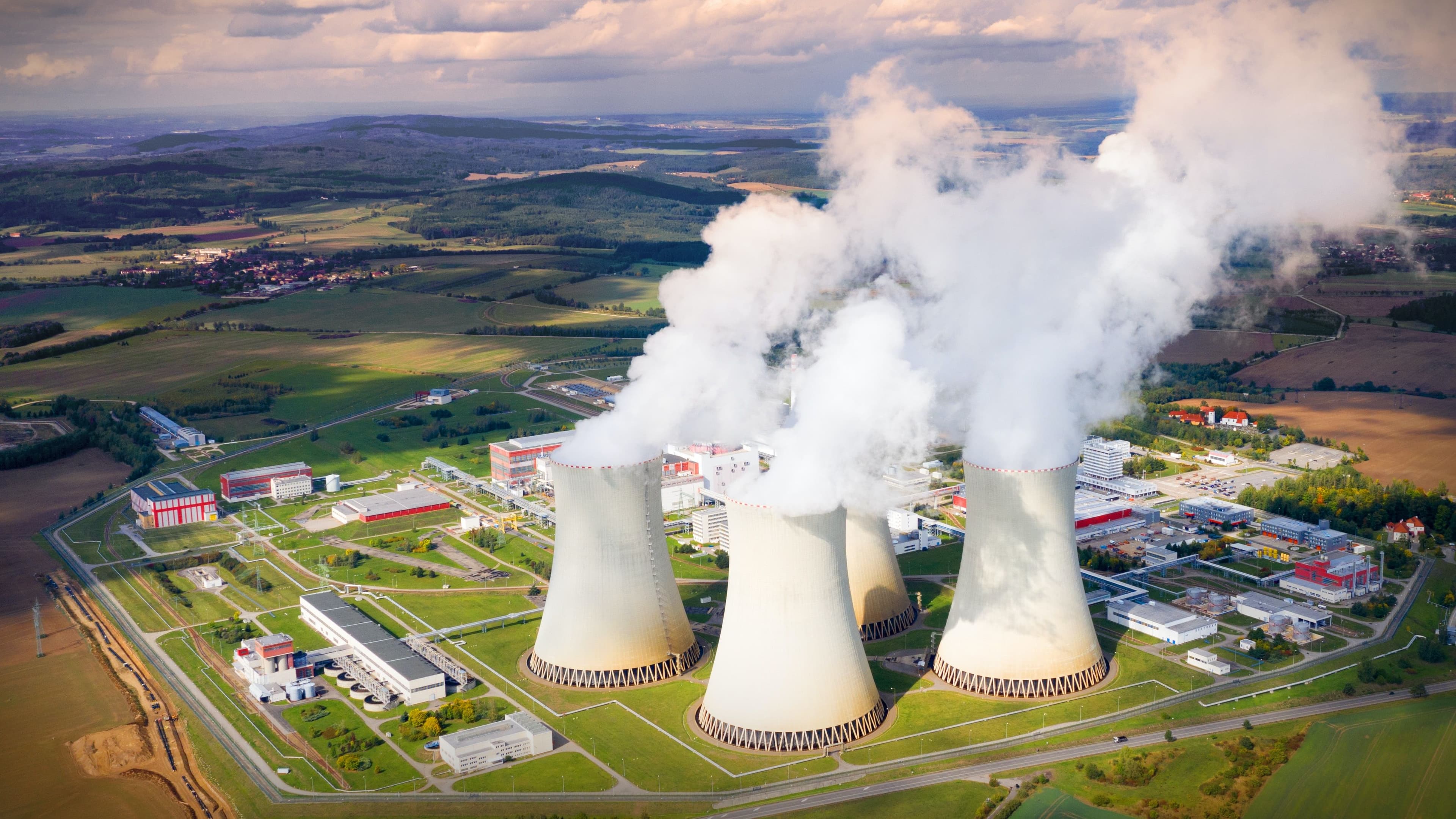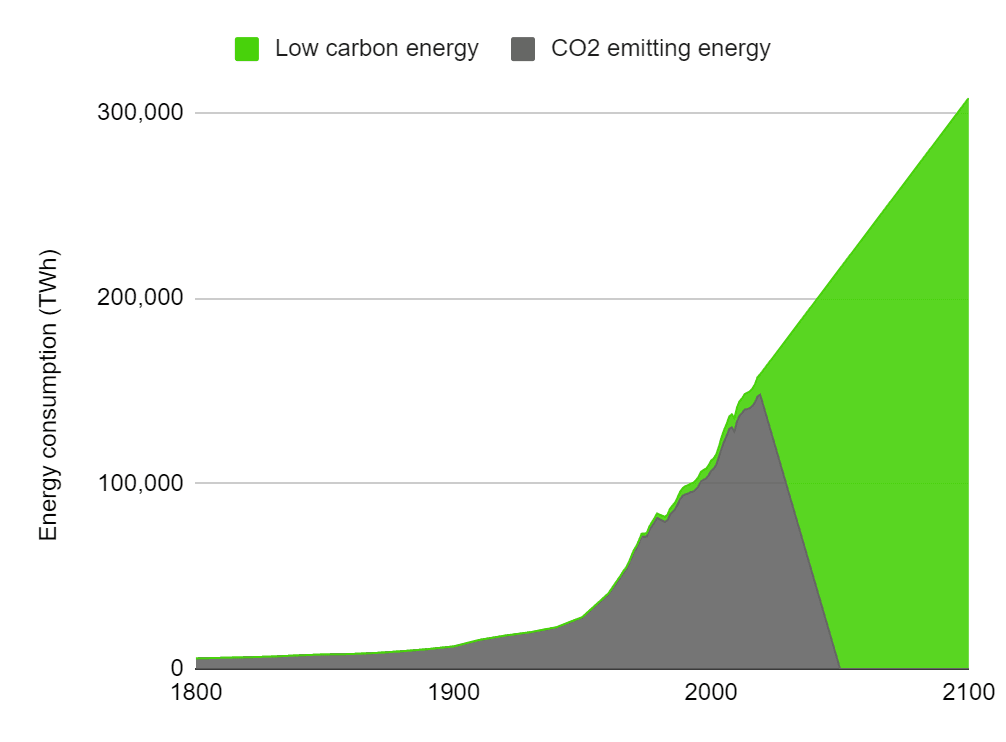Clean Air Task Force

▲ Photo by Getty Images on Unsplash
Related research
The Clean Air Task Force is a highly respected and impact-focused non-profit formed in 1996 that advocates for clean air measures and innovation in neglected low-carbon technologies. They are our top climate change charity.
What problem are they trying to solve?
The Clean Air Task Force works to reduce air pollution emissions from fossil fuels and to solve climate change while ensuring that people in growing economies have enough energy to meet their needs. The scale of this challenge is shown below:
Figure 1. Our decarbonisation challenge

Source: Climate report calculations sheet
To date, they have predominantly focused on US policy, but they recently expanded to Europe, the Middle East and North Africa.
What do they do?
The Clean Air Task Force’s work is currently roughly evenly divided between (1) clean air advocacy and (2) promotion of innovation in neglected low-carbon technologies. Much of their clean air work includes advocating in the US at the state and federal level for regulations of fossil fuel emitting infrastructure in electricity production, industry and transport, but they have also advised several countries on methane regulation development.
Their innovation work involves changing the conversation around decarbonisation, and encouraging policymakers, energy researchers and other non-profits to take a technology-agnostic approach to decarbonisation. In addition to this, they run highly effective and pragmatic campaigns to encourage policy support for innovation in these technologies. Much of the innovation work has been in the US, but they have also worked in China and are expanding their work in Europe.
Why do we recommend them?
- The Clean Air Task Force is our top pick in climate change. They combine high-quality research on climate policy, with a demonstrated ability to achieve major policy change on a small budget.
- They have a strong track record of achieving state and federal policy change in the US in multiple campaigns since their formation.
- They focus on innovation in neglected low-carbon technologies, which is our priority climate change intervention. Their project prioritisation aims explicitly to maximise climate impact.
- They have a very strong team of policy researchers, technical experts, and policy campaigners.
Overall, the Clean Air Task Force is the most effective organisation we have found at advancing a technology-agnostic energy innovation agenda.
Firstly, they think carefully about project prioritisation and explicitly focus on important but neglected climate solutions. They are guided by what the science says about which solutions are needed in order to solve climate change, rather than following prevailing opinion among other NGOs. Their staff also make contributions to the research and have convened and contributed to numerous highly influential studies that have helped to change the conversation in energy policy circles.1
Secondly, they have an outstanding track record in achieving policy change. We have examined CATF’s track record in some depth by assessing the following campaigns:
- Power Plant Campaign and Clear the Air: non-climate pollutants (1996 – 2006).
- The Methane Partners Campaign (2000 – present).
- Campaign for tax incentives for carbon capture and sequestration (CCS) (2009 – 2017).
- Campaign for advanced nuclear innovation (ongoing)
To assess these campaigns, we investigated written material and source campaigns and spoke with other NGOs, philanthropists, civil servants and policymakers who were involved. The evidence we collected suggested that CATF played a crucial role in all four campaigns that would have been very difficult for other NGOs to replace. All of these campaigns achieved their initial goals, and CATF conceived of, led or co-led all of them. Their project success rate is highly unusual among organisations that we have assessed.
Moreover, all of these campaigns plausibly have had a large effect on emissions. For example, the tax incentives for CCS will likely abate tens of millions of tonnes of CO2 over the next decade.
Thirdly, there is reason to think that the Clean Air Task Force could have substantial influence on the policies of a possible Biden administration. In 2020, they were invited by the US House of Representatives’ Energy and Commerce Committee to help draft a bipartisan climate bill - the CLEAN Future Act - which would ensure a net-zero economy by 2050. Clean Air Task Force staffers are regularly invited to the US Congress to discuss clean energy bills (See examples here and here, and a compendium here).
Fourthly, as we discuss in the next section, they have a very strong team of leaders, analysts and pragmatic advocates.
Why do we trust this organisation?
The Clean Air Task Force has a very strong team. We have been consistently impressed by their transparency and honesty in our dealings with them. Whenever we have checked a claim they have made about their own role in achieving a result, we have never found them to have exaggerated.
We have been consistently impressed by the quality of the research that the Clean Air Task Force produces, finding it to be well-reasoned and even-handed. Their team is widely respected among the various climate experts, academics and activists that we have spoken to. Their Executive Director Armond Cohen was awarded the prestigious Sam Rose ’58 and Julie Walters Prize at Dickinson College for Global Environmental Activism. This annual prize is awarded to “an individual or organization that makes a defining difference and advances responsible action on behalf of the planet, its resources and people.” Previous winners include Bill McKibben, Elizabeth Kolbert and Mark Ruffalo. Their researchers and analysts have contributed world-leading highly-cited research to the academic literature (for examples, see footnote 1).
Former CATF staff members and consultants have also moved into influential positions in the US government.
What are the major open questions?
Overall, we are confident that additional donations to Clean Air Task Force will be well spent. Nonetheless, we have three main uncertainties about their work. Firstly, as they only decided to expand into Europe, the Middle East and North Africa in 2020, there is a risk that this could lead to a loss of focus on US policy, and also that their expansion might not succeed. Nevertheless, we are on balance supportive of their moves to expand.
Secondly, their clean air/fossil fuel regulation work is not among our top priority interventions in climate change because we think it is less neglected and has lower leverage than clean energy innovation. However, we think it is valuable for them to do this work on net because it allows them to build coalitions with local grassroots clean air campaigning organisations, including environmental justice organisations, and traditional large environmental NGOs, such as the Environmental Defense Fund, the Sierra Club and the National Resources Defense Council.
Thirdly, about 20% of their budget is today focused on short-lived climate pollutants, such as methane. We are unsure about the value of this work because we think that it may overweight methane relative to CO2. We plan to investigate this question in more depth in 2021.
Message from the organisation
Despite 30 years of policy and debate on climate change, the world is nowhere near on track to maintaining a livable climate. In the quarter century since the Kyoto Protocol where the world pledged to reduce carbon emissions, annual carbon emissions have increased by 50% rather than decreasing.
Renewable energy like wind and solar have gotten us off to a good start, but provides only 3% of global energy supply. To have a chance of winning, we need to commercialize and deploy a full portfolio of zero and negative carbon energy options as fast as we can. We also need to create the policy and enabling regulatory framework – sticks and carrots – that will force uptake of new technology. Now is the time. Actually, yesterday was the time, but better late than never.
CATF is the only major global NGO focused full time on a complete solution suite. Partly through our efforts, more organizations and funders are joining in this approach, but CATF continues to serve a major role as idea engine, convener, and catalyst to move more technology-inclusive strategies forward.
More resources
- The Clean Air Task Force Mission Video
- Policy and Innovation Video: Describes their work at the intersection of policy and innovation to drive implementable solutions.
- The Latest: lists their most recent blog posts.
- My Climate Journey podcast Episode 26: Armond Cohen, Co-Founder and Executive Director at Clean Air Task Force
- Great.com podcast talks with the Clean Air Task Force
- Armonds Cohen’s Public Address at Dickinson College released on 12 October 2020.
- Clean Air Task Force YouTube channel
Disclaimer: We do not have a reciprocal relationship with any charity, and recommendations are subject to change based on our ongoing research.
Notes
-
[Examples](https://www.zotero.org/google-docs/?jYzxHY" target="_blank) include: Stephen Brick and Samuel Thernstrom, “Renewables and Decarbonization: Studies of California, Wisconsin and Germany,” The Electricity Journal 29, no. 3 (April 1, 2016): 6–12, https://doi.org/10.1016/j.tej.2016.03.001; Jesse D. Jenkins, Max Luke, and Samuel Thernstrom, “Getting to Zero Carbon Emissions in the Electric Power Sector,” Joule 2, no. 12 (2018): 2498–2510; Peter J. Loftus et al., “A Critical Review of Global Decarbonization Scenarios: What Do They Tell Us about Feasibility?,” Wiley Interdisciplinary Reviews: Climate Change 6, no. 1 (January 1, 2015): 93–112, https://doi.org/10.1002/wcc.324; Christopher T. M. Clack et al., “Evaluation of a Proposal for Reliable Low-Cost Grid Power with 100% Wind, Water, and Solar,” Proceedings of the National Academy of Sciences 114, no. 26 (June 27, 2017): 6722–27, https://doi.org/10.1073/pnas.1610381114; Steven J. Davis et al., “Net-Zero Emissions Energy Systems,” Science 360, no. 6396 (June 29, 2018), https://doi.org/10.1126/science.aas9793. ↩